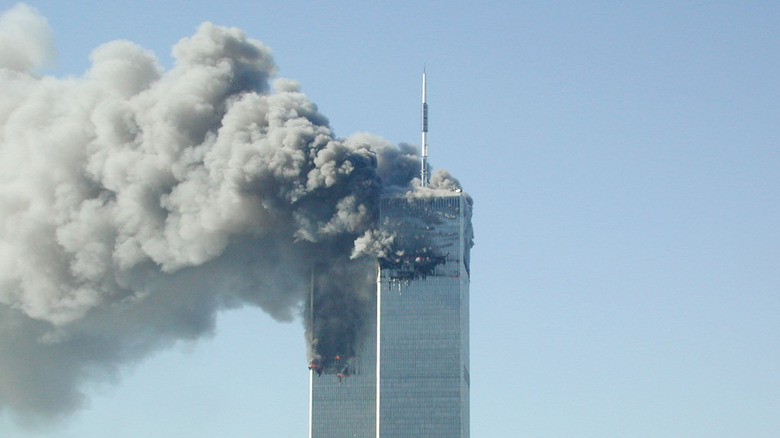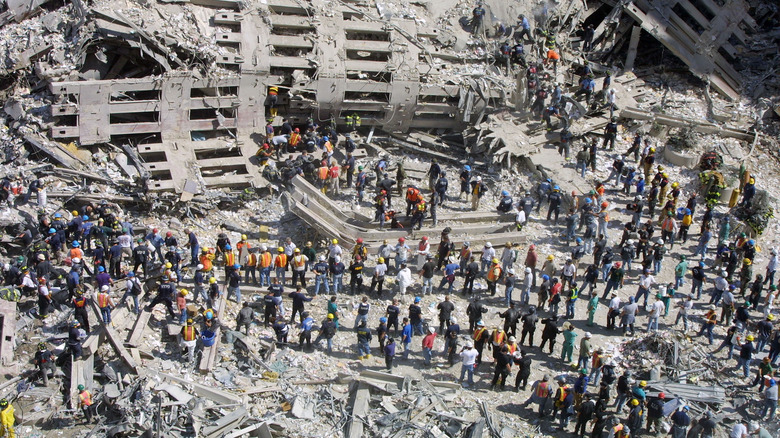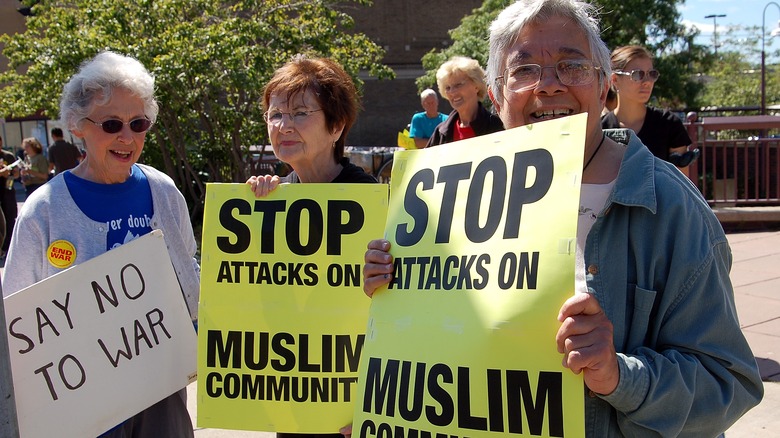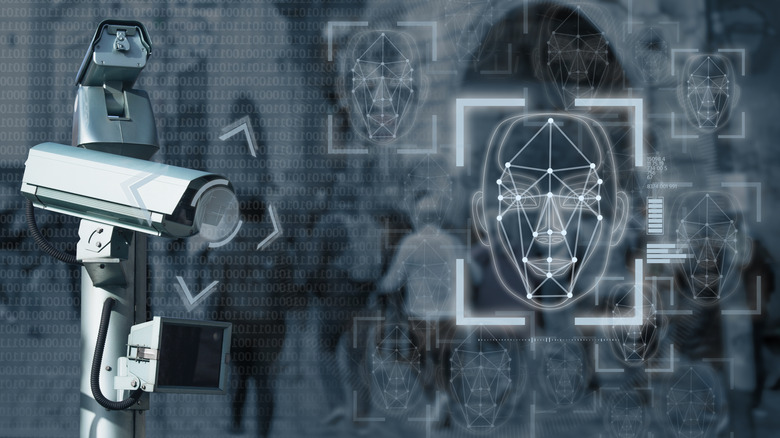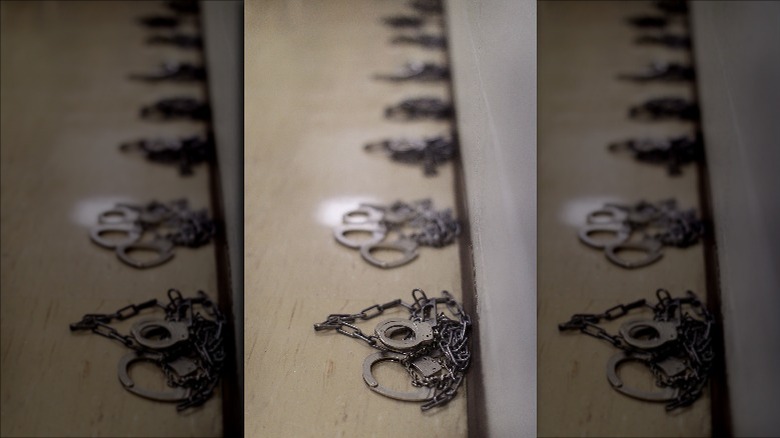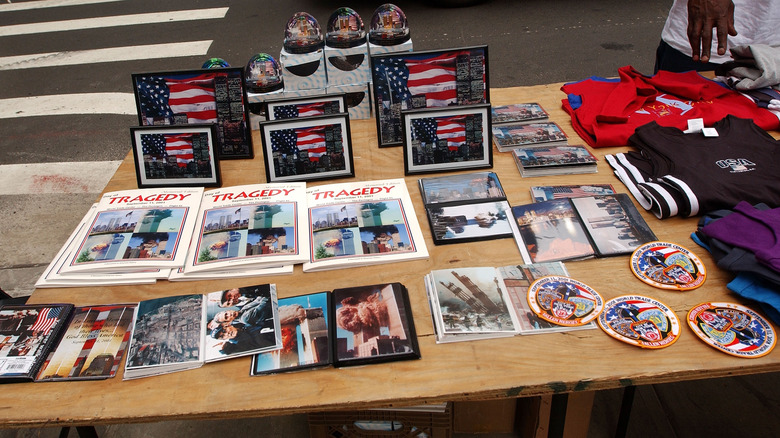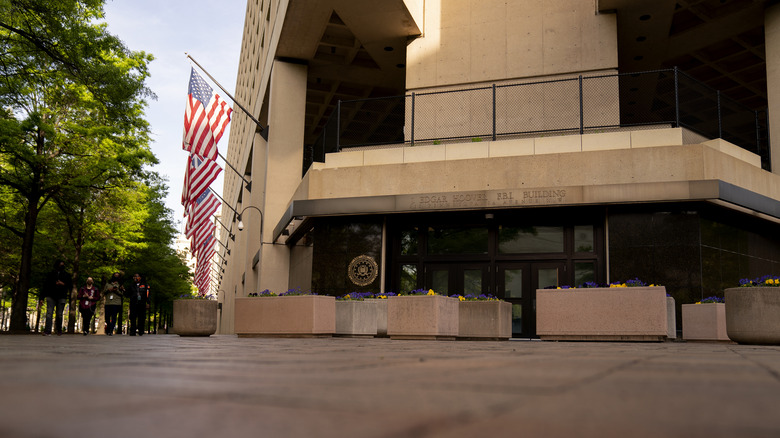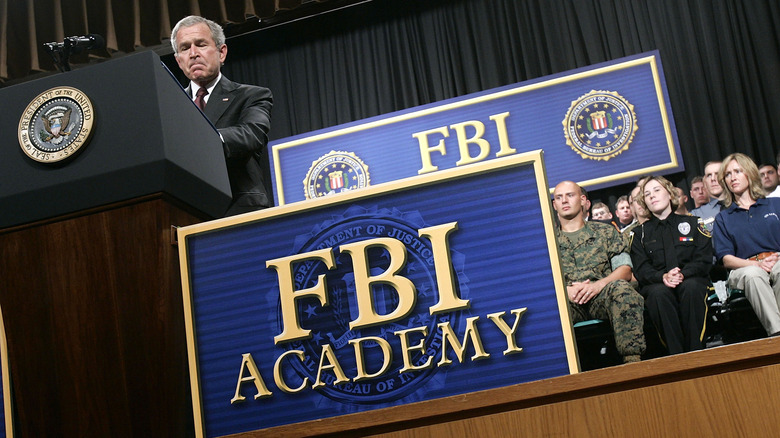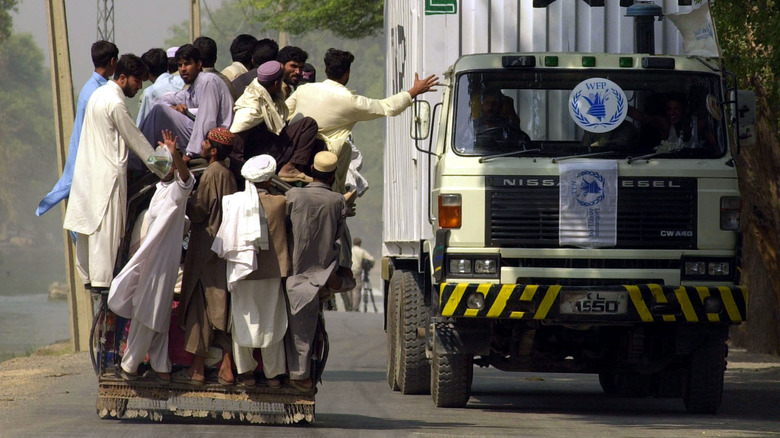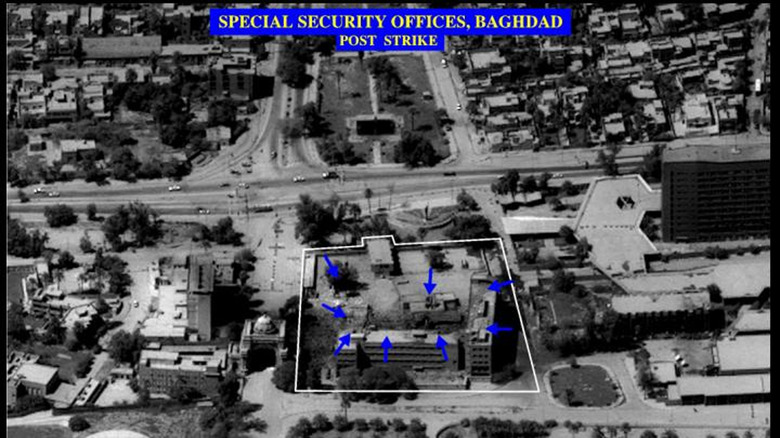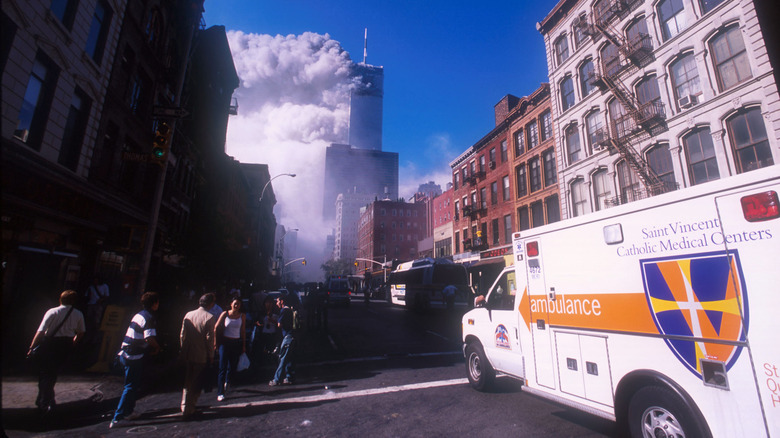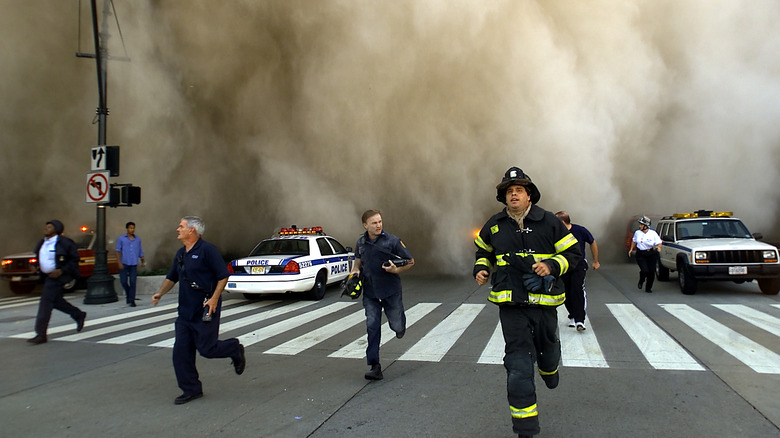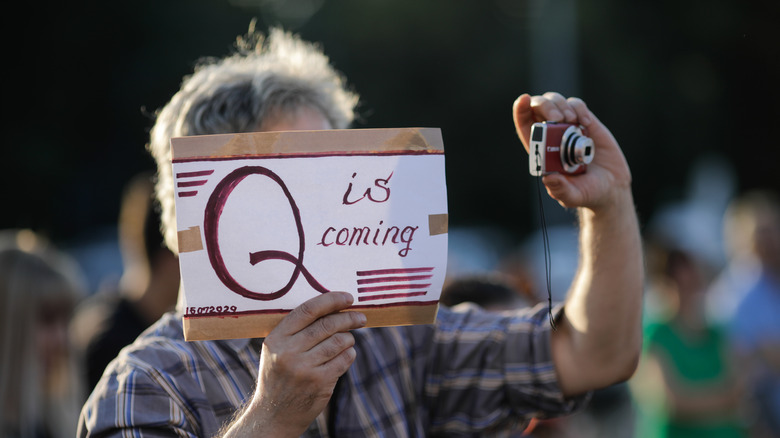Messed Up Things That Happened After The September 11th Attacks
The terror attacks on the World Trade Center in New York, the Pentagon, and the coordinated hijacking of United Flight 93, on September 11, 2001, were the deadliest in United States history. In total, nearly 3,000 people are believed to have lost their lives, according to Britannica, a tragic and terrifying loss that created a wave of sadness and anger that irreversibly shaped the future of the U.S.
Academics have since declared that the world is still living in the "long shadow of 9/11." And this is indeed true — but for many who were perhaps too young to remember the event itself, it may be difficult to imagine how quickly the atmosphere changed, almost overnight, as a result of the attacks. As noted by KQED for example, and as impossible as it might be to imagine now, prior to the tightening of airport security as a response to 9/11, it was possible to board a plane without a full security check, and to carry liquids, knives, and lighters on board. As with many changes that occurred in the aftermath of the attacks, such precautions as were introduced in airports around that time have since become permanent fixtures in our lives. Both the short- and long-term repercussions of 9/11 have been life-altering for millions around the world — here are just some of the tragic and shocking things that emerged in its wake.
Phone calls continued from inside the debris
The aftermath of the September 11 terror attack on the World Trade Center ensured the streets of New York were chaos for days and weeks to come, with the horror of the attack spilling over into September 12 as the search for survivors among the wreckage continued. As thousands of rescuers made up of fire fighters, police officers, trained search and rescue canine units, and paramedics continued to work their way through "the pile" in a race against time to uncover potential survivors, with chilling evidence that people were still trapped alive, said New York major Rudy Giuliani (per The Independent), from cell phones calls coming from beneath the rubble.
But while the discovery of survivors offered some glimmers of hope at Ground Zero, the ongoing trial of those involved in searching the debris remained deeply traumatic due to the prevalence of human body parts they continually uncovered. One rescue worker told The New York Times, "You can only stand it because there's no faces ... You don't have to look at any faces." Per the same source, experts raised hopes in the days following the attack that "voids" of intact structures, such as the World Trade Center concourse, may yet be discovered to stand intact, and hold survivors. Sadly, only a few more people were found alive in the debris on the days following the attacks.
Anti-Muslim racist attacks increased dramatically
Per The Miami Herald, by 4 p.m. on the day of the September 11 attacks, officials had already positively identified the involvement of Osama Bin Laden, founder of the militant Islamic terror group Al-Qaeda based in Afghanistan, as the main guiding force behind an atrocity that claimed almost 3,000 lives. And as details of Bin Laden's background and anti-American stance began to hit headlines in the U.S., Americans mourning the most deadly terror attacks on their country's soil found themselves in a post-9/11 climate charged with anti-Muslim rhetoric, suspicion, and hate. As a result, American Muslims were sadly subjected to a huge spike in violence and bigotry towards them, with hate crime incidents rising year-on-year, according to data released by the FBI (per The World).
That the attack themselves took place nearly three quarters of the way through the year suggests that the increase is even more stark than the numbers initially suggest, while the same data set — published in 2014 — shows that the level of hate crime against Muslims has sadly since remained significantly higher than in the years before 9/11.
The surveillance state expanded rapidly
The legislation that came into effect following the September 11 terror attacks in 2001 was wide-ranging, with repercussions that still exist today. Much of what passed through Congress in the final months of 2001 concerned widening the powers of the security services to try and intercept any future terror attacks and those that were potentially already in the works. However, as commentators warned at the time and as academics have since demonstrated through retrospective analysis, such laws encroached mightily on the rights of private citizens, with one scholar, Jesse Jones of Texas A&M University, going as far as to describe the changes to American privacy rights as the "Birth of Big Brother."
Domestically, much of what changed for U.S. citizens did so with the passing of the "Patriot Act," which was passed 45 days after 9/11. Per the ACLU, chief among the changes the act introduced was that it allowed FBI agents to issue National Security Letters (NSLs) without the approval of a judge, of which they were allowed to harvest ordinary citizens' phone and computer data, as well as credit and banking history, without their knowledge — data which the FBI is allowed to hold onto indefinitely. Similarly, the Patriot Act eroded the Fourth Amendment by giving security services the powers for "sneak and peek" searches of properties under warrant without the owner's knowledge. As reported by The New York Times, much of the data monitoring activity that occurred after 9/11 was later ruled illegal.
There was a huge increase in deportations
As anti-immigrant sentiment gained a foothold within U.S. political discourse following the events of 9/11 amid a keen desire to ensure that such an atrocity could never happen again on U.S. soil, the government created the Department of Homeland Security, as well as the Immigration and Customs Enforcement body, for whom sweeping powers were introduced to allow for the deportation of immigrants both documented and undocumented. The Transactional Records Access Clearing House notes that deportation cases increased sharply from 1.6 million in the decade before 9/11 to 2.3 million the decade that followed. As noted by ABC, many immigrants became liable for criminal deportation without ever being found guilty of a crime — they simply have to be charged, with deportation being the price for such minor offenses as drug possession or even cycling on the sidewalk.
As reported by HuffPost, those who gained the most from sweeping immigration reforms were private companies such as the Corrections Corporation of America and the GEO Group, operators of mass private immigration centers who have lobbied so successfully that they now process almost half of the 400,000 immigrant detainees the U.S. imprisons each year, making incredible profits as they do so.
Tellingly, however, deportations that were linked explicitly to terrorist activity dropped by more than half the decade after 9/11 to 37, down from 88 the decade previous, according to The Denver Post.
The sellers cashed in
At Ground Zero in New York there now stands the National September 11 Memorial and Museum, dedicated to the memories of all those who lost their lives in the 2001 terror attacks — "a monument to human dignity, courage, and sacrifice," per the official website. Nevertheless, its opening in 2014 raised some eyebrows thanks to the museum's gift shop, the contents of which — hoodies, badges, and, per NY Mag, a much-criticized cheese plate — many found tacky and offensive, per the BBC.
"To me, it's the crassest, most insensitive thing to have a commercial enterprise at the place where my son died," said Diane Horning, who lost 26-year-old Matthew in the attacks, per The New York Post.
Management responded that they relied on the gift shop along with ticket sales to keep the museum — an important resource in preserving the memory of 9/11 — open. However, others who sought to capitalize on the events of 9/11 had more strictly commercial motives. As reported by Fox Business in 2015, years after the tragic event, a huge "online market" is still out there for buyers and sellers ready to trade in authentic 9/11 "relics." Uniforms, equipment, and objects said to be made from the steel of the Twin Towers themselves have all, the source claims, been listed for sale online, while one winemaker drew criticism after attempting to market a 9/11 commemorative wine, made from grapes harvested in 2001.
The FBI began a program of entrapment
The Federal Bureau of Investigation, which carries the motto "Fidelity, Bravery, Integrity" on its emblem, was looked to as the organization charged with identifying and neutralizing potential terror cells. The bureau was undoubtedly under incredible pressure in the early years of the 20th century to keep the nation they were there to protect safe from further harm, but evidence later emerged that in the years following 9/11 the FBI hadn't quite been matching up to the standards of integrity that it claimed to maintain.
In 2011, The Guardian reported how the FBI, under pressure to demonstrate that they were active and productive during the ongoing "war on terror," ran a widespread campaign of sting operations against hundreds of Americans — most of whom were vulnerable or desperate, as opposed to actively threatening — and entrapping them in phony terror plots orchestrated by the bureau itself. With the use of often unvetted informants in Muslim and other ethnic communities, the FBI would plan stings in which they themselves passed their targets weapons and equipment, leading to highly publicizable arrests. Many cases, including those of the Liberty City Seven, a small and eccentric cult whom most analysts have admitted were harmless, and the Newburgh Four, who were accused of plotting to bomb synagogues in Riverdale, New York, resulted in lengthy prison sentences for those involved, with judges required to hand down sentences of a minimum of 25 years in prison for cases related to terrorism, according to The Village Voice.
No "major" terrorist plots were uncovered by new powers
While the Patriot Act continued to exacerbate the sense of paranoia in the U.S., deportations eventually doubled compared to pre-9/11 figures, as KQED notes. And as much as the FBI was looking to appear proactive in those uncertain years following the deadliest terror attacks in U.S. history, many experts have retrospectively demonstrated that, despite the wide-ranging and sweeping new laws that came into effect after 9/11, the bureau finally admitted in 2015 that the Patriot Act itself, which had allowed agencies to harvest the data of millions of innocent Americans without their knowledge, had failed to help uncover any "major" terrorist plots or lead to breakthroughs in prior terror-related cases, according to The Washington Times.
According to The Intercept, as of April 2021, 969 people have been prosecuted as either domestic or international terrorists in the United States, but as their data shows, few of those who wound up in jail had any links to terrorist organizations — or any of the means by which to commit an attack against the U.S. More than half have since been released without ongoing surveillance, which The Intercept notes demonstrates "that the government does not regard them as imminent threats to the homeland" ... or perhaps that they never truly were to begin with.
The endless War on Terror has displaced millions
Back in December 2001, while the nation was still reeling from the tragic event of September 11 and the U.S. was preparing to commence what President George W. Bush was calling the "War on Terror," an article published by the Brookings Institution argued that the new anti-terrorist military intervention in the Middle East was more likely to resemble the Cold War with the Soviet Union rather than any other conflict in living memory, warning that it seemed destined to be "nasty, brutish and long." How right they were.
Since then, the U.S. has been continually at war in the Middle East, most notably in Afghanistan, where the initial objective was the defeat of the Taliban ruling faction that had allowed Al-Qaeda to flourish in the country, according to Britannica. While the U.S. officially ended their combat mission in the country in 2014, Voice of America notes that as of 2021, thousands of U.S. troops were still stationed in the country, while the Taliban remains active in the country, with negotiations still ongoing.
According to a report by the Watson Institute of International and Public Affairs at Brown University, more than 37 million people are estimated to have been forced to leave their homes as a direct result of post-9/11 U.S. military campaigns, contributing significantly to the refugee crisis of recent years.
The invasion of Iraq led to a bloody civil war
Soon after the U.S. military's "War on Terror" commenced in 2001, post-9/11 counter-terrorism policy saw politicians' attention turn to an old enemy — Iraq. Per Britannica, the nation with whom the U.S. had been at war in the early '90s was identified as a threat by President George W. Bush as a result of failure to allow weapons inspectors to carry out checks on Iraq's capacity to produce and deploy "weapons of mass destruction." Following Iraqi leader Saddam Hussein's refusal to cede to Bush's demand to leave the country in March 2003, the U.S. commenced a massive campaign of airstrikes, according to the United States Institute of Peace (USIP). Per Britannica, the U.S., assisted by troops from the United Kingdom and several other countries, swiftly defeated the Iraqi troops by the end of April and eventually captured Hussein, who had gone into hiding, in December of the same year.
But however quickly the early stages of the Iraq War seemed to have brought about the defeat of the country's ruling powers, the destabilization of the country following their removal plunged Iraq into a long and bitter civil war, with the U.S. entangled in efforts to protect the newly installed democratic government against insurgency amid growing sectarian violence, according to the USIP. According to the Iraq Body Count database, 288,000 people have died violently in the events following the 2003 Iraq War, including up to 208,000 civilians.
Post-9/11 fraud cases
The events of September 11, 2001, have remained sacrosanct in the American psyche not only due to the terrible loss that the nation witnessed that day but also because of the incredible bravery and self-sacrifice of those first responders who rushed to assist at the scene of the attack, with many losing their lives in the process.
Which made reports shared by ABC and others that more than 100 police officers, firefighters, and public servants had been charged with fraudulently soliciting millions of dollars in social security payments in the years after 9/11 especially shocking. "Many participants cynically manufactured claims of mental illness as a result of September 11, dishonoring the first responders who did serve their city at the expense of their own health and safety," said Manhattan District Attorney Cyrus Vance, per Insider.
Some even more brazen fraud cases were reported in the press as early as 2002, per The New York Times, which reported the case of a woman who invented a fictional husband to collect $53,000 from a 9/11 relief fund.
"We've had fictitious victims, we've had victims who have been dead for years, we've had people in prison calling to say that they were dead," Sgt. Daniel Heinz of the NYPD special fraud squad told The New York Times. "I used to have a lot of the names of the victims in my head from notifying so many families. Now I have the names of all the perps."
9/11 increased cancer rates
The number of those killed in the September 11 terror attacks is typically given today as 2,977, a harrowing figure. However, the negative health impact for those who were at the scene on the day of the attacks is likely to make the true number of those who lost their lives as a direct result of the attacks far higher.
As reported by Time, first responders who arrived at the scene of the attacks following the collapse of the Twin Towers and worked frantically to save potential survivors from the rubble did so amid a toxic cloud of dust from the fallen buildings that contained such dangerous substances as asbestos, lead, and benzine — and which was highly carcinogenic.
According to Newswise, a 2019 study concluded that first responders were at a higher risk of developing cancers of the head and neck, which Cancer Treatment Centers of America reports that their chances of developing leukemia, prostate cancer, or thyroid cancer were all significantly higher. The same source notes that some 2,000 first responders are estimated to have died of diseases directly resulting from the 9/11 rescue operation.
9/11 conspiracy theories set the stage for 21st-century paranoia
The events of September 11, 2001, and their fallout over the months and years that followed were as world-changing as they were chaotic, as tragic as they were incomprehensible. And though it is possible to come to grips with what happened and why with the benefit of 20 years' hindsight, at the time the events of 9/11 seemed almost inexplicable. And so, in those early days of the internet, rumors and conspiracy theories began to circulate that 9/11 was an "inside job," orchestrated by the federal government, according to Popular Mechanics, which took it upon itself to debunk the many shaky theories and pieces of "evidence" used by 9/11 "truthers" to point to the existence of a government conspiracy and attempted cover-up.
Not since the assassination of John F. Kennedy and rumors of the faking of the moon landings had the U.S. found itself consumed by so pervasive a conspiracy theory. But as The Wall Street Journal recently explained, as the internet has come to permeate our lives and paranoia and distrust of mainstream media has continued to grow, conspiracy mindedness has become epidemic in the years since 9/11, with QAnon, anti-vax movements, and flat-earthers all being given the oxygen of publicity by the internet and our current collective inability to separate reputable claims from bogus ones.
